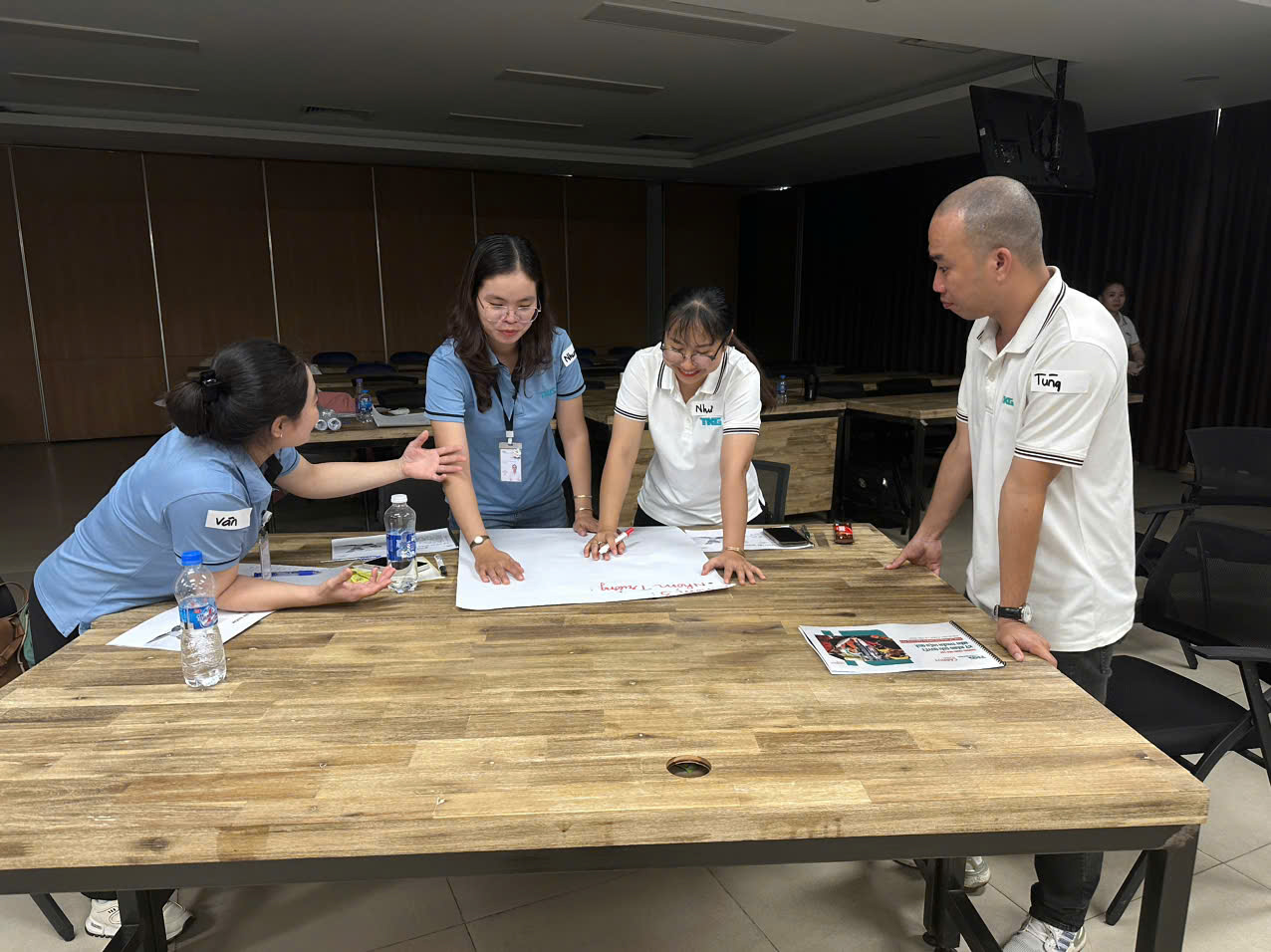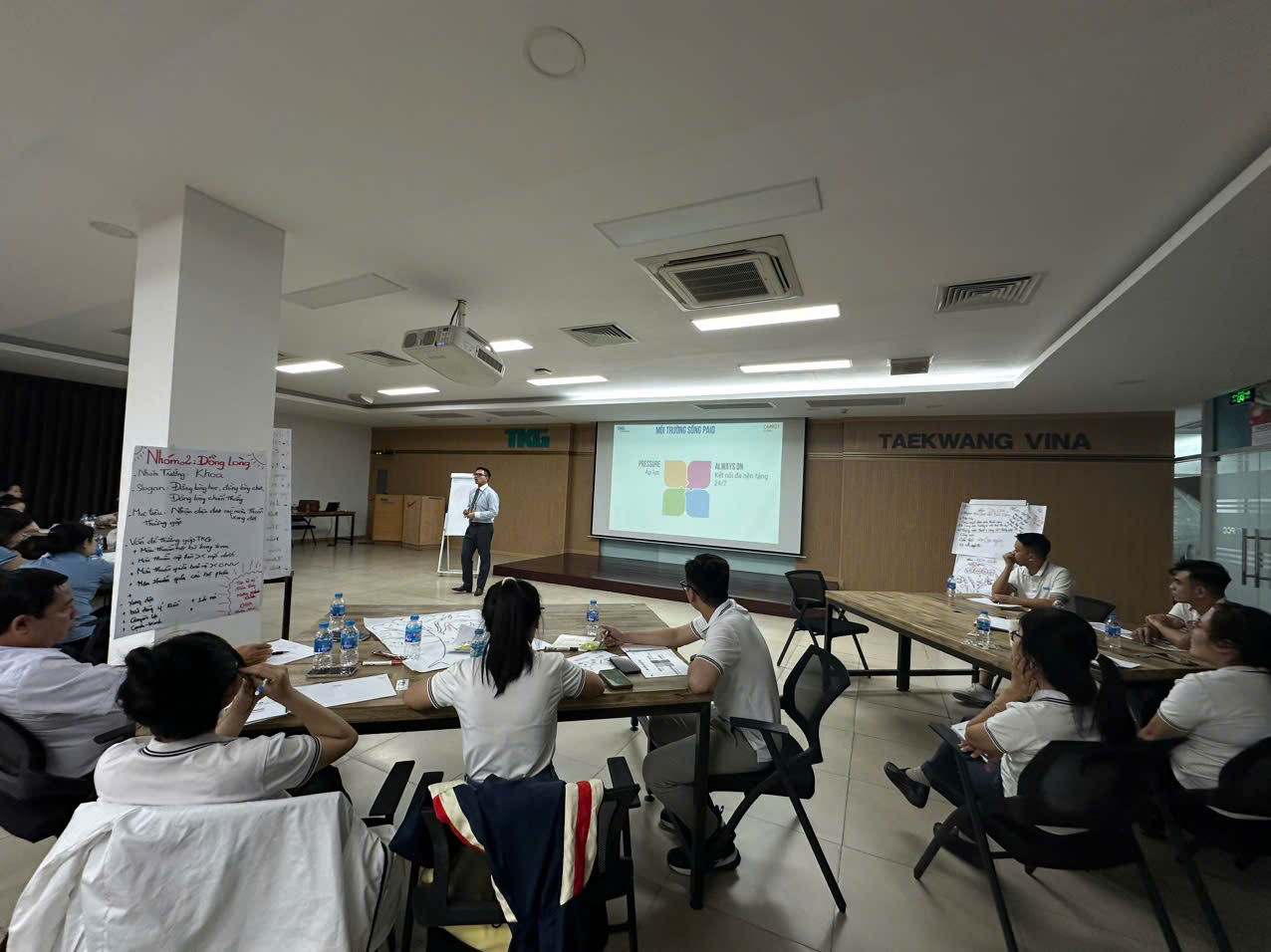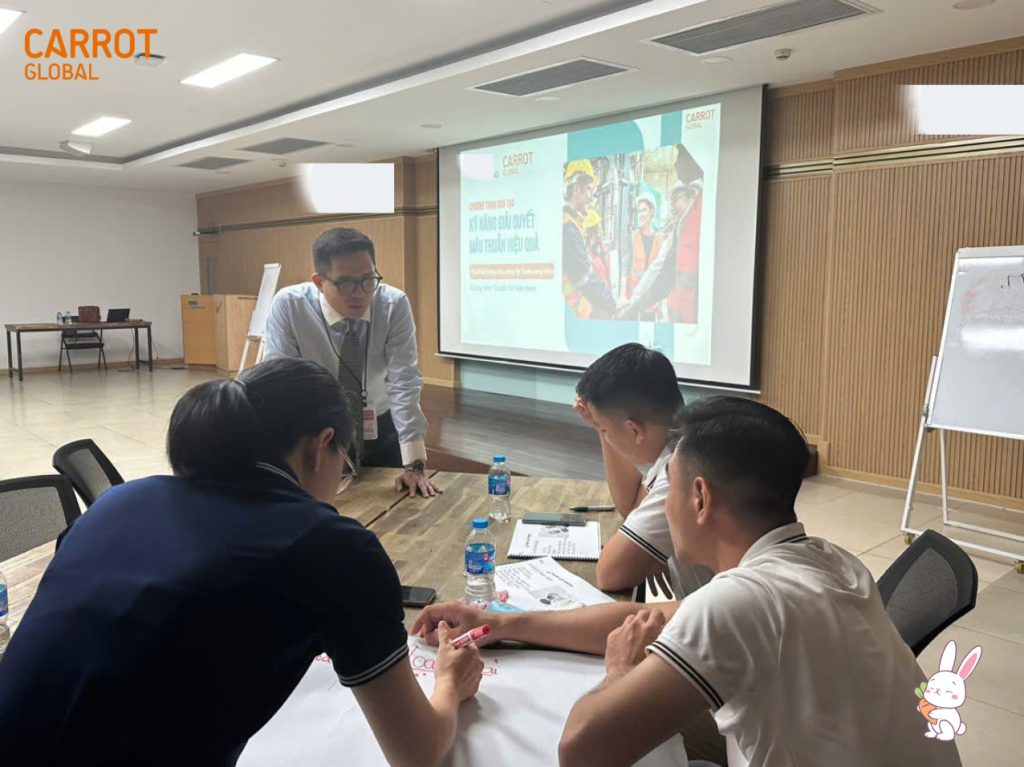01-Day Conflict Management Training Program for ER Team
In April 2025, CARROT Global Vietnam achieved a significant milestone by successfully completing an intensive Conflict Management Training program. Designed for the Employee Relations (ER) team, this program aimed to enhance their ability to manage workplace conflicts effectively. By integrating emotional intelligence and strategic communication techniques, the training not only addressed immediate conflict situations but also contributed to promoting a harmonious and productive work environment. This article delves into the various aspects of the training, highlighting its comprehensive approach and long-term benefits for participants.

Course Highlights
The course offered a well-rounded exploration of conflict management, focusing on equipping participants with essential skills needed in today’s dynamic work environments. The training covered a range of topics, ensuring that every participant left with a deeper understanding of conflict management strategies.
Conflict Resolution Theories and Strategies
The training began with an in-depth analysis of various conflict resolution theories and strategies. Participants learned about the nature and sources of conflict, helping them identify the root causes of disputes. This foundational knowledge was crucial for developing effective strategies to manage and resolve conflicts. Trainers elaborated on different conflict resolution styles, such as accommodating, avoiding, and collaborating, allowing participants to choose the most suitable approach for each situation. By understanding these theories, participants gained the ability to apply theoretical knowledge to practical scenarios.
Effective Communication Techniques
Effective communication is at the heart of any successful conflict resolution process. The training emphasized two key communication skills: active listening and assertive communication. Participants were taught to listen actively, ensuring they fully understood different perspectives before responding. This skill is vital for building trust and rapport during conflicts. Additionally, assertive communication techniques were introduced, helping participants express their thoughts and feelings confidently and respectfully. These skills collectively enhanced the participants’ ability to navigate challenging conversations and resolve conflicts amicably.
Emotional Intelligence Development
The course also focused on developing emotional intelligence, a critical component in managing conflicts. Participants explored self-awareness, learning how to recognize their own emotions and understand how these emotions influenced their reactions to conflict situations. This self-awareness was complemented by empathy training, where participants cultivated the ability to empathize with others. By understanding the emotional components of conflict, participants were better equipped to address the underlying issues and foster a more collaborative and understanding work environment.
Interactive Learning Experience
To ensure an engaging and effective learning experience, the training incorporated various interactive elements. Participants engaged in role plays, case studies, and both group and individual work, which reinforced their learning and improved their practical application of conflict management skills.
Role Plays and Case Studies
Role plays and case studies formed a significant part of the training, allowing participants to apply theoretical knowledge to real-world scenarios. Through role plays, participants practiced conflict resolution techniques in a safe and controlled environment. The case studies provided insights into complex conflict situations, encouraging participants to analyze and develop appropriate solutions. This hands-on approach enabled participants to test their skills, receive feedback, and refine their strategies for managing conflicts effectively.
Real-world Scenarios
The training also included discussions on real-world scenarios relevant to the participants’ industry. This ensured that the skills acquired during the training were immediately applicable to their workplace. By analyzing specific industry-related conflicts, participants gained a practical understanding of how to apply conflict resolution strategies in their professional settings. This practical focus helped bridge the gap between theory and practice, ensuring participants were well-prepared to handle conflicts in their daily work environments.
Group Discussions and Individual Work
Group discussions and individual work were integral to the training’s interactive approach. Participants engaged in collaborative problem-solving exercises, where they worked together to develop conflict resolution strategies. These group discussions encouraged the sharing of diverse perspectives and fostered a collaborative learning environment. Individual work allowed participants to reflect on their learning and apply it to personal experiences, ensuring a comprehensive understanding of conflict management principles. This balanced approach of group and individual activities ensured participants had a well-rounded learning experience.
Practical Application and Long-term Benefits
The training aimed to provide participants with skills that were not only immediately applicable but also beneficial in the long term. The focus was on developing conflict resolution skills that would foster a positive work environment and enhance collaborative problem-solving within the organization.
Immediate Conflict Resolution Skills
One of the primary goals of the training was to equip participants with immediate conflict resolution skills. By mastering effective communication techniques and emotional intelligence, participants were able to address conflicts as they arose. This proactive approach to conflict management helped reduce the negative impact of disputes on the organization. Participants reported a greater confidence in handling conflicts and a more positive attitude towards resolving disputes, contributing to a more harmonious workplace environment.
Fostering a Positive Work Environment
The training also emphasized the importance of fostering a positive work environment. By equipping participants with conflict management skills, the program contributed to a culture of open communication and collaboration. Participants learned how to address conflicts constructively, minimizing misunderstandings and promoting mutual respect. This shift towards a more positive work environment not only improved employee morale but also enhanced productivity and job satisfaction. The training’s long-term impact was evident in the improved workplace relationships and increased trust among team members.
Enhancing Collaborative Problem-Solving
Collaborative problem-solving was a key focus of the training, as it is essential for effective conflict management. Participants learned how to work together to identify solutions that met the needs of all parties involved. This collaborative approach encouraged creative problem-solving and innovation, as team members were more willing to share ideas and perspectives. By enhancing collaborative problem-solving skills, the training supported the organization’s goal of building a more cohesive and effective team. Participants left the training with a renewed commitment to working together to achieve common goals.
Conclusion
The successful completion of the Conflict Management Training program in April 2025 marked a significant achievement for CARROT Global Vietnam and its participants. By focusing on emotional intelligence, effective communication, and collaborative problem-solving, the training equipped participants with the skills needed to manage conflicts constructively. This comprehensive approach not only addressed immediate conflict situations but also contributed to the long-term development of a positive and productive work environment. As organizations continue to navigate the complexities of the modern workplace, programs like this remain crucial in fostering a culture of understanding, collaboration, and mutual respect.


